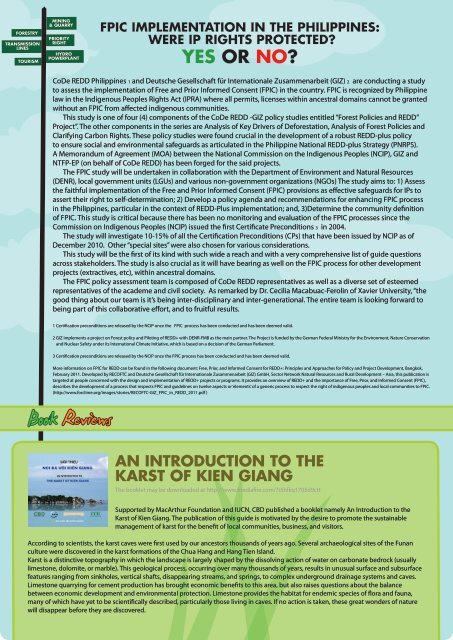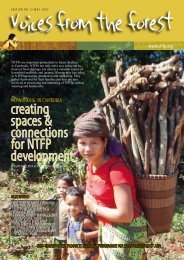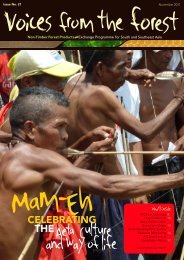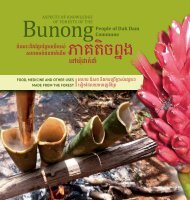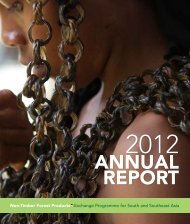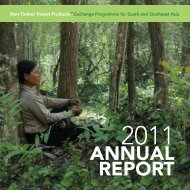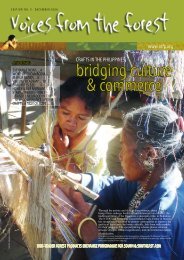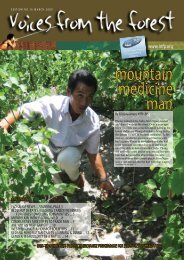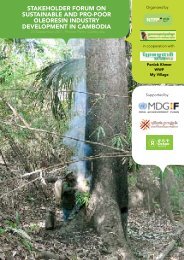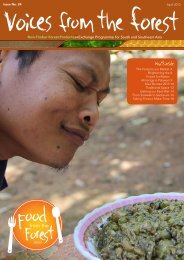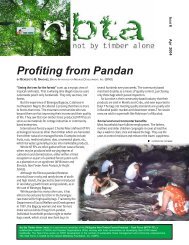Edition No. 20 - Non-Timber Forest Products Exchange Programme
Edition No. 20 - Non-Timber Forest Products Exchange Programme
Edition No. 20 - Non-Timber Forest Products Exchange Programme
You also want an ePaper? Increase the reach of your titles
YUMPU automatically turns print PDFs into web optimized ePapers that Google loves.
FORESTRY<br />
TRANSMISSION<br />
LINES<br />
TOURISM<br />
MINING<br />
& QUARRY<br />
PRIORITY<br />
RIGHT<br />
HYDRO<br />
POWERPLANT<br />
FPIC IMPLEMENTATION IN THE PHILIPPINES:<br />
WERE IP RIGHTS PROTECTED<br />
YES OR NO<br />
CoDe REDD Philippines 1 and Deutsche Gesellschaft für Internationale Zusammenarbeit (GIZ) 2 are conducting a study<br />
to assess the implementation of Free and Prior Informed Consent (FPIC) in the country. FPIC is recognized by Philippine<br />
law in the Indigenous Peoples Rights Act (IPRA) where all permits, licenses within ancestral domains cannot be granted<br />
without an FPIC from affected indigenous communities.<br />
This study is one of four (4) components of the CoDe REDD -GIZ policy studies entitled “<strong>Forest</strong> Policies and REDD”<br />
Project”. The other components in the series are Analysis of Key Drivers of Deforestation, Analysis of <strong>Forest</strong> Policies and<br />
Clarifying Carbon Rights. These policy studies were found crucial in the development of a robust REDD-plus policy<br />
to ensure social and environmental safeguards as articulated in the Philippine National REDD-plus Strategy (PNRPS).<br />
A Memorandum of Agreement (MOA) between the National Commission on the Indigenous Peoples (NCIP), GIZ and<br />
NTFP-EP (on behalf of CoDe REDD) has been forged for the said projects.<br />
The FPIC study will be undertaken in collaboration with the Department of Environment and Natural Resources<br />
(DENR), local government units (LGUs) and various non-government organizations (NGOs) The study aims to: 1) Assess<br />
the faithful implementation of the Free and Prior Informed Consent (FPIC) provisions as effective safeguards for IPs to<br />
assert their right to self-determination; 2) Develop a policy agenda and recommendations for enhancing FPIC process<br />
in the Philippines, particular in the context of REDD-Plus implementation; and, 3)Determine the community definition<br />
of FPIC. This study is critical because there has been no monitoring and evaluation of the FPIC processes since the<br />
Commission on Indigenous Peoples (NCIP) issued the first Certificate Preconditions 3 in <strong>20</strong>04.<br />
The study will investigate 10-15% of all the Certification Preconditions (CPs) that have been issued by NCIP as of<br />
December <strong>20</strong>10. Other “special sites” were also chosen for various considerations.<br />
This study will be the first of its kind with such wide a reach and with a very comprehensive list of guide questions<br />
across stakeholders. The study is also crucial as it will have bearing as well on the FPIC process for other development<br />
projects (extractives, etc), within ancestral domains.<br />
The FPIC policy assessment team is composed of CoDe REDD representatives as well as a diverse set of esteemed<br />
representatives of the academe and civil society. As remarked by Dr. Cecilia Macabuac-Ferolin of Xavier University, “the<br />
good thing about our team is it’s being inter-disciplinary and inter-generational. The entire team is looking forward to<br />
being part of this collaborative effort, and to fruitful results.<br />
1 Certification preconditions are released by the NCIP once the FPIC process has been conducted and has been deemed valid.<br />
2 GIZ implements a project on <strong>Forest</strong> policy and Piloting of REDD+ with DENR-FMB as the main partner. The Project is funded by the German Federal Ministry for the Environment, Nature Conservation<br />
and Nuclear Safety under its International Climate Initiative, which is based on a decision of the German Parliament.<br />
3 Certification preconditions are released by the NCIP once the FPIC process has been conducted and has been deemed valid.<br />
More information on FPIC for REDD can be found in the following document: Free, Prior, and Informed Consent for REDD+: Principles and Approaches for Policy and Project Development, Bangkok,<br />
February <strong>20</strong>11. Developed by RECOFTC and Deutsche Gesellschaft für Internationale Zusammenarbeit (GIZ) GmbH, Sector Network Natural Resources and Rural Development – Asia, this publication is<br />
targeted at people concerned with the design and implementation of REDD+ projects or programs. It provides an overview of REDD+ and the importance of Free, Prior, and Informed Consent (FPIC),<br />
describes the development of a process that respects FPIC and guidelines on twelve aspects or ‘elements’ of a generic process to respect the right of indigenous peoples and local communities to FPIC.<br />
(http://www.forclime.org/images/stories/RECOFTC-GIZ_FPIC_in_REDD_<strong>20</strong>11.pdf )<br />
Book Reviews<br />
AN INTRODUCTION TO THE<br />
KARST OF KIEN GIANG<br />
The booklet may be downloaded at http://www.mediafire.com/t5hfkq1705d9ctt<br />
Supported by MacArthur Foundation and IUCN, CBD published a booklet namely An Introduction to the<br />
Karst of Kien Giang. The publication of this guide is motivated by the desire to promote the sustainable<br />
management of karst for the benefit of local communities, business, and visitors.<br />
According to scientists, the karst caves were first used by our ancestors thousands of years ago. Several archaeological sites of the Funan<br />
culture were discovered in the karst formations of the Chua Hang and Hang Tien Island.<br />
Karst is a distinctive topography in which the landscape is largely shaped by the dissolving action of water on carbonate bedrock (usually<br />
limestone, dolomite, or marble). This geological process, occurring over many thousands of years, results in unusual surface and subsurface<br />
features ranging from sinkholes, vertical shafts, disappearing streams, and springs, to complex underground drainage systems and caves.<br />
Limestone quarrying for cement production has brought economic benefits to this area, but also raises questions about the balance<br />
between economic development and environmental protection. Limestone provides the habitat for endemic species of flora and fauna,<br />
many of which have yet to be scientifically described, particularly those living in caves. If no action is taken, these great wonders of nature<br />
will disappear before they are discovered.


